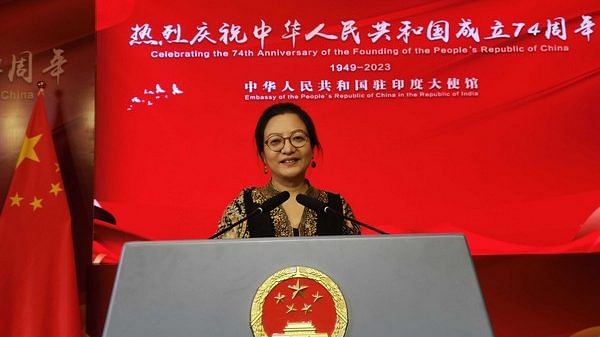New Delhi: China’s Chargé d’Affaires in India Ma Jia said Thursday that relations with India suffered “some setbacks” in recent years and this was not what Beijing would like to see.
His comments came in the backdrop of the biggest military build-up between the two countries since the 1962 war, after Chinese soldiers in 2020 intruded into the Indian side of the Line of Actual Control (LAC).
However, Ma said there had been positive momentum in bilateral ties between the two countries.
Even though trade has largely maintained its path as the Indian government sought to implement countermeasures, there has been no diplomatic forward movement except both sides meeting to resolve the border tensions.
China has not even appointed an ambassador to India in two years, since the previous envoy, Sun Weidong, completed his term in October 2022.
While speaking at an international conference commemorating Indian poet and writer Rabindranath Tagore’s 1924 visit to China, Ma said: “China-India relations suffered some setbacks in recent years. This is not what we want to see… Some people focus on the differences between China and India, and cast doubt on the bilateral relations.”
Adding that Beijing sees relations with India from a strategic and long-term view, the Chinese diplomat said both countries share broad common interests and have huge potential for cooperation.
“(If we) seek common ground while shelving differences, properly manage divergences and work towards the same direction, I am confident that we will surely be able to dispel the dark clouds and usher in the spring,” Ma added.
Also read: India and China don’t agree on how much they trade with each other, and the gap is widening
The last couple of weeks have seen an exchange of barbs between India and China over the latter’s claims over Arunachal Pradesh.
On Thursday, the same day Ma spoke at the conference, India’s Ministry of External Affairs (MEA) spokesperson reiterated the government’s stance that Arunachal Pradesh was an integral and inalienable part of India, while addressing a weekly media briefing.
Last month, China released its fourth list of 30 new names for various places in Arunachal Pradesh, to which India responded on 28 March that Beijing may “repeat its baseless claims” but the ground reality remained unchanged.
Since troops from both countries clashed in the Galwan Valley in 2020, India and China have held more than 20 rounds of military commander-level talks for complete disengagement in the remaining areas along the LAC in Eastern Ladakh and restoration of peace in border areas. The latest round was held in February at the Chushul-Moldo border.
External Affairs Minister S. Jaishankar has also repeatedly said relations between the two countries cannot be normal or progress if the border areas remain disturbed.
‘Positive momentum’
While speaking at a conference on ‘Commemorating the Centenary of Rabindranath Tagore’s visit to China’, the Chinese Chargé d’Affaires said bilateral relations between the two countries had shown “positive momentum of improvement” over the past year.
“The two sides maintained high-level communications and interactions. Bilateral trade has grown steadilyand people-to-peopleexchanges between our two countries have recovered gradually,” Ma said.
Despite geopolitical tensions, goods trade between the two countries hit a record high in October, owing to a surge in imports from China, like gold during the festive season.
That said, India has been making efforts to bring down its trade deficit with China, which crossed $100 billion in 2022.
Last month, Pakistan’s Chargé d’Affaires to India, Saad Ahmad Warraich, called for peaceful coexistence, sovereign equality and mutual respect between Islamabad and New Delhi.
"Founding fathers of Pakistan and India envisioned amicable relations between the two countries.The goal of regional peace & stability can be achieved by enhancing mutual understanding, addressing shared concerns&resolving longstanding disputes including Jammu and Kashmir": Cd'A pic.twitter.com/9oMEtluQGC
— Pakistan High Commission India (@PakinIndia) March 28, 2024
Ties between the two countries deteriorated after August 2019, when Pakistan opposed the Narendra Modi government’s decision to scrap the special status of Jammu and Kashmir.
(Edited by Tikli Basu)
Also read: ‘Third parties have no right to interfere,’ says China on India backing Philippines



